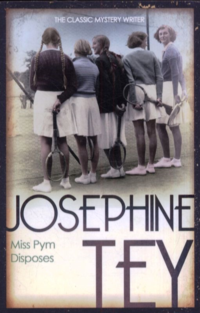
Well, here's a book that took me completely by surprise. I thought I'd read all Josephine Tey's celebrated crime novels, but I saw a review of this one recently and realised I hadn't. That wasn't the surprise, though. I'd been expecting that something dramatic would happen quite early on in the novel, and this proved to be far from the case. I've rarely used the expression slow burn, but my goodness this book really deserved it.
Miss Pym Disposes is set in a 'college of physical culture', undoubtedly based on the physical education college Tey herself attended as a young woman. The college principal, Henrietta Hodge, has invited Lucy Pym, a one-time teacher of French who has written a book on psychology which has unexpectedly become a huge success, to give a lecture to the students. Lucy, who has made money out of her book and rather enjoys the creature comforts that has brought, finds the spartan living conditions, early hours and frightfully plain food something of a strain, and initially decides she must head back to London as soon as possible. But one thing leads to another and she finds herself getting to know the students and the staff, and taking an interest in the forthcoming leaving demonstration of the skills they have been learning. She's particularly drawn to some of the girls -- beautiful Pamela Nash, known as Beau, and her quiet, clever friend Mary Innes, awkward Miss Dakers, Irish Miss O'Donnell and others. Then there's Miss Rouse, who Lucy first encounters making a mess of a gymnasium exercise she really ought to have conquered by now. Rouse, as she's always referred to, is not a likeable person, though she seems to be favoured by Henrietta, presumably because of the very high marks she is getting in her final exams. But when Lucy agrees to invigilate an exam, she becomes convinced that Rouse has been cheating. Henrietta, however, refuses to believe it.
Everything comes to a head in the final week of term. A job placement has come up at a most prestigious institution, and everyone expects that Mary Innes will be the chosen student. But Henrietta chooses Rouse instead, despite an outcry from the staff and desperate pleas from Lucy. Then Rouse, who has been assiduously practicing every day in the gym, has a serious accident -- or is it? This happens about three-quarters into the novel, and the remaining chapters show Lucy working out a solution which is, however, completely overthrown in the last couple of pages. That's what I mean by a slow burn. Miss Pym Disposes is billed as a mystery novel, and so indeed it is, but that led me to believe something mysterious would take place a good deal earlier. Does this matter? Not in the least, except that I was waiting all the time for this dramatic event instead of fully savouring the wonderful build-up -- the gloriously detailed picture of a life which I suppose doesn't exist any more, a world of keen, bright, healthy, vibrant and beautiful young women living and working together in a college dedicated to their education. Of course P.E. is still taught, but I suspect it's become just another subject taught at university.
So the historical, sociological background is a great joy in itself -- the novel was written in 1946, but as Tey was a student thirty years earlier, her own experiences and memories undoubtedly fed into the picture. Then there's Lucy Pym, an unlikely sort of heroine in many ways. Though presumably in her forties, she's very innocent and unsure of herself in many ways, despite the fluke of her successful book. And it had been a fluke:
She had read her first book on psychology out of curiosity, because it seemed to her an interesting sort of thing;and she read all the rest to see if they were just as silly. By the time she had read thirty-seven books on the subject, she had evolved ideas of her own on psychology; at variance, of course, with all thirty-seven volumes she had read to date. In fact, the thirty-seven volumes seemed to her so idiotic and made her so angry that she sat down there and then and wrote reams of refutal. Since one cannot talk about psychology in anything but jargon, there being no English for most of it, the reams of refutal read very learnedly indeed.
Lucy comes to doubt aspects of her own knowledge of psychology at the end of the novel. She decides her own real strength lies in 'character as betrayed by facial characteristics', and resolves to write a book about it. This aspect of psychology clearly interested Josephine Tey herself, and is at the basis of several of her other novels. In fact The Daughter of Time, published five years later in 1951, in which Detective Inspector Alan Grant, confined to a hospital bed, arrives at a radical re-interpretation of the character of Richard III based on a portrait, could well be the book Lucy was planning to write in 1946. I came to the conclusion that Grant was Lucy's friend 'Alan', to whom she refers in passing from time to time. Nice intermingling of fact and fiction. All very intriguing, and I'm really glad I read it.
